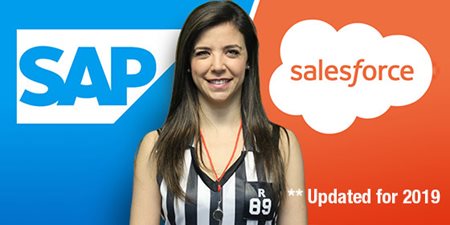A CRM Review and Comparison - SAP vs. Salesforce 2019 Edition
SAP versus Salesforce, the continuance of the great debate. We revisit a previous post and update it for 2019. What will change? Who may win? Let’s talk about it.

When asking any business what their most valuable asset is, there will likely be all kinds of answers depending on their industry, what state their business is in, and who you ask. Perhaps it is IT’s opinion on the newest product or partnership, maybe it’s the employees, and still, others may speak to marketing. We can all agree that the one thing all of these answers have in common is this; their assets are aimed towards acquiring more customers.
A business’s customer relationship management (CRM) system is one of the most valuable tools a company can have. However, choosing a CRM, much like deciding any software, can be a herculean task since there are numerous providers and a plethora of different features. With that being said, we are looking at the differences between SAP CRM versus Salesforce.
Where do SAP and Salesforce Sit in the SaaS Market?
The overall enterprise software-as-a-service market is generating more than $20 billion in quarterly revenues, and is up 32% per year, according to a report by Synergy Research Group (SRG).
Microsoft is still the dominant player—overtaking Salesforce nine quarters ago—in the enterprise SaaS space. With a market share topping 17% worldwide and a 45% sales growth, the US-based software giant flourished in this last year due to its leadership in the high-growth collaboration segment. However, according to the figures, Salesforce is still a strong challenger in the CRM space but has relatively low growth compared to other SaaS sectors at just 25%. Rounding out the players is Adobe, Oracle, and SAP, with Oracle scoring the highest growth rate among these three. Combined, these top-five players hold over half of the overall market share, and well over double the combined share of the next ten players in the market, which includes Google, ServiceNow, and ADP.
“There is a fascinating battle for SaaS playing out, with traditional enterprise software vendors slugging it out with born-in-the-cloud vendors like Workday, Zendesk, ServiceNow, and Dropbox,” said John Dinsdale, a Chief Analyst at Synergy Research Group. “The latter groups are helping to rapidly transform the market, but the more traditional players like Microsoft, SAP, Oracle, and IBM still have a huge base of on-premise software customers that they can convert to a SaaS-based consumption model. Meanwhile, Cisco and Google too are making ever-bigger inroads into the SaaS market via Cisco’s collaboration apps and software vendor acquisitions and Google’s G Suite.”
SAP vs Salesforce — A Side by Side Comparison
| |
SAP |
Salesforce |
| Average Customer Rating |
3.5/5 stars |
4/5 stars |
| Target Customer Size |
- Businesses 1-50 employees, less than $50m in revenue
- Businesses 50-100 employees, revenue $50m-$100m
|
- Businesses 1-50 employees, less than $50m in revenue
- Businesses 50-100 employees, revenue $50m-$100m
- Businesseswith 100+ employees, Revenue $100m+
|
| Pricing |
By Quote
Pricing Models include:
- Free Option
- Monthly Payment
- One-time Payment
- Annual Subscription
- By Quote
|
Starting from $25
Pricing Models include:
- Free Option
- Monthly Payment
- One-time Payment
- Annual Subscription
- By Quote
|
| Features |
- Lead Management
- Sales Force Automation
- Contact History
- Contact Management
- Document Management
- Sales Reports
- Time Tracking
- Pipeline Management
- Email Marketing
- Partner Management
|
- Account and Contact Management
- Opportunity Management and Score
- Lead Management
- Sales Data
- File Sync
- File Sharing
- Sales Forecasting
- Salesforce Mobile AOO
- Contact Manager
- Real-time Visibility
- Drag and Drop Interface
- Dashboards
- Visual Workflow
- Multi-Currently Support
- In-line editing
- Lead Assignment and Routing
- Rules-based Lead Scoring
- Web-to-Lead Capture
- Campaign Management
- Duplicate Blocking
- Mass Email
- Salesforce Engage
- Email Templates
- Campaign Influence
- Einstein Activity Capture
- Calendar
- Sales Console APP
- Enterprise Territory Management
- Opportunity Splits
- Salesforce CPQ and Billing
- Contracts, Orders, Quotes, Products, and Price Books
- Chatter, Files, Topics, andRecommendations
- Case Management
- Lightning Bolt Solutions
- Partner Communities
- Lead Registration
- Roles and Permissions
- Process Builder
- Lightning Platform
- Web Services API
- Google APPsintegration
- File Storage per user
- Sandbox
|
| Integrations |
Not available |
- Force.com
- Heroku
- ExactTarget Fuel
- Third-party apps on Salesforce AppExchange
- Service Cloud
- Marketing Cloud
- Pardot
- Desk.com
- Analytics Cloud
- Data Cloud
- JIRA
- Freshdesk
- FinancialForce
- LeadExec
- Samanage
- Zuora
- Zendesk
|
| Operating Systems |
|
|
| Mobile Compatibility |
- Android
- Windows
- Apple iOS
|
- Android
- Windows
- Apple iOS
|
| Deployment |
- In-house maintenance
- Cloud and web-based supported
- Mobile supported
|
- On-premise not supported
- Cloud and web-based supported
- Mobile supported
|
Support
|
- Phone: 24/7 toll-free, worldwide phone support can be purchased.
- Online: support included with annual maintenance and support contract.Self-help portal, knowledge base, and live chat included with annual maintenance and support contracts.
|
- Phone: 24/7 toll-free, worldwide support available for non-technical queries only.
- Online: Online case submission with two-day response time is included in the subscription fee. Faster response time (within one hour) and online support for developers can be purchased.A help website, knowledge base and communityareincluded in the subscription fee. Content for improving user adoption, productivity, and access to a dedicatedsuccess representativecan be purchased.
|
| Training |
- Training courses with certifications can be purchased.
|
- A “Getting Started” online catalog is included in the subscription fee. Additional training catalogs, customizable training templates, and role-based training modules can be purchased.
|
| Prominent Clients |
- Purchasing Power
- Pregis
- National Hockey League - NHL
|
- Time WarnerCable
- Dell
- Wells Fargo
- Comcast
|
|
SAP vs. Salesforce — Feature vs. Feature Comparison — The Advantages and The Disadvantages
SAP and Salesforce are equally powerful CRMs. Some businesses may say that Salesforce is the best product offered, but it also has a higher rate of users replacing it with a different CRM system. SAP, on the other hand, is one of the biggest names in business software, dominating many areas over and above CRMs. However, businesses agree that, at times, it can fall short in comparison. We can all accept that depending on which business or industry (more importantly, your business requirements and needs), either will work to help streamline and automate your processes. Let’s delve into the top feature-to-feature comparison for 2019 and identify which takes the win.
Batch Email Marketing
Advantage: Salesforce
Batch—or bulk—email marketing is a method of digital marketing in which businesses send automated emails to a group of users’ emails selling products, services, or sharing news. Today, email marketing is still a very effective form of marketing and engagement, and as the trend moves toward greater personalization and customization, a robust CRM system is required. Salesforce edged out SAP with their advantages in email marketing via its Sales Cloud as well as its capacity to design emails and newsletters from both prebuilt templates or templates you can design and code from scratch. Salesforce’s sophistication in CRM data provides users the ability to build personas for targeted audiences, develop email journeys, or designate content workflows to encourage continuous engagement.
Email Utilities
Advantage: Salesforce
With tools to create, make, and send emails, we also need a tool to monitor them. Email utilities are just that; a tool that allows users to track email metrics, like open rate, clicks, and other essential marketing data. Salesforce again takes the advantage for email. With its capability to assign interactions to contacts and opportunities, it adds a layer of sophistication that SAP lacks.
Online Case Management
Advantage: SAP
Online case management is the management of information, events, contacts, contracts, support ticket, workflow and more, on an individual case-to-case, or client-to-client basis. The benefits of this feature are straightforward. Case management software helps your sales, support, and marketing teams to stay very organized and provide them the ability to quickly and effectively use this vital information. SAP takes this advantage with their robust functionality and diversity based on the genius way they collect and organize data from various sources as well as their enhanced searchability. Not only does SAP’s case management handle customer support tickets, but it also manages a range of internal HR and financial cases such as illness benefits, dispute management, tax audits, and collection management. Additionally, SAP has incident tracking that provides customer fields and ample data storage to keep your incident records thoroughly detailed.
Business Intelligence
Advantage: Salesforce
A tool and practice which is gaining significant popularity, Business intelligence (BI) is a technology-driven process for analyzing data and presenting actionable information to help executives, managers, and other corporate end-users make informed business decisions. Salesforce wins the advantage with its approach to utilizing separate and powerful BI platforms that integrate seamlessly. QlikView is a paid add-on that delivers business intelligence advantages with ease-of-use, and minimal—to no—reliance on IT.
Custom Reports
Advantage: SAP
An in-demand feature—one that is key to business intelligence—is the development of custom reports. Although Salesforce took the upper hand with BI, SAP takes the advantage when it comes to custom reports. With SAP, a user can create and change interactive reports, all from the same screen using a very intuitive and user-friendly interface. Furthermore, SAP offers unique assigning and access abilities so that you can assign reports to a specific user, or divisions, and with role-based access, you can keep your business data secured to organizationally appropriate roles.
Industry Business Process Support
Advantage: SAP
Each business is different and so too are their business processes. As such, software needs to accommodate a range of business types and cater to each such market. How well the system can specialize varies system-to-system, and SAP wins the advantage by appealing to a broader range of industries. SAP Business is an all-in-one solution based on SAP ERP and supports core business processes across diverse sectors. Their industry business process support includes financials, procurement, logistics, product development, manufacturing, and human capital management.
Knowledge Creation Workflow
Advantage: Salesforce
Knowledge creation workflow is a fancy way of saying a searchable database of information accessible to both internal and external users. Salesforce takes this advantage as it offers a more comprehensive and user-friendly knowledge base for its users. With Salesforce Knowledge, users can easily create and manage content as well as find and view. The knowledge base even goes beyond its features due to Salesforce offering an extensive knowledge resource with how-to guides, forums, tutorial resources, and more.
Ending Notes
The SAP CRM versus Salesforce debate is a close one, but based on its market share, growth, and its comparison of the advantages of disadvantages, Salesforce takes the win, especially when it comes to individual features. With that being said, Salesforce—or even SAP for that matter—may not be the best CRM for every business. As with selecting any tool for your business, it’s essential to keep your requirements in mind and choose one that works best for you. What do you think of our analysis of the differences between Salesforce and SAP? Do you have any questions about choosing CRM software?

Lynette Sawyer
Lynette Sawyer is a Web Project Manager for Falcon-Software, a digital web agency founded in 1994. For the last 13-years Lynette has been in various digital capacities and her expertise goes beyond Project Management. Lynette brings experience and knowledge in graphic design, marketing communications, project management, product management and engagement.